- Home
- Vasily Grossman
Life and Fate Page 22
Life and Fate Read online
Page 22
A lame little boy told Viktorov that Political Instructor Golub and Lieutenant Vovka Skotnoy, with whom he shared his billet, had left with all their belongings. Viktorov had only moved in a few days before: until then he and Golub had been billeted with a dreadful landlady, a woman with a high forehead and protuberant yellow eyes. Looking into her eyes was enough to make you feel ill.
In order to get rid of her tenants, she used to fill the hut with smoke. Once she even sprinkled ash in their tea. Golub had tried to persuade Viktorov to report her to the commissar, but he couldn’t bring himself to do so.
‘Well, I hope the cholera gets her!’ said Golub.
Their new billet had seemed like paradise. But they had not been allowed to stay there for long.
Soon Viktorov was carrying a kitbag and a battered suitcase past the tall grey huts that seemed almost two storeys high. The crippled boy hopped along at his side, taking aim at chickens and at planes circling over the forest with a German holster Viktorov had given him. He walked past the hut Yevdokiya Mikheevna had smoked him out of; he could see her expressionless face behind the dirty window-panes. No one ever talked to her when she stopped for a rest as she carried her two wooden buckets back from the well. She had no cows and no sheep; she didn’t even have any house-martins in the eaves. Golub had asked questions about her, hoping to bring to light her kulak background, but she turned out to be from a very poor family. The women in the village said she had gone crazy after her husband’s death: she had walked into a lake in cold autumn weather and sat there for days. But she had been taciturn even before that, even before her marriage.
There he was, walking through a village in the forest – and in a few hours he would have flown away for ever. The village, the forest, the elks who came into the vegetable gardens, the ferns, the yellow pools of resin, the cuckoos – all these would cease to exist for him. The old men and the little girls would disappear, as would the stories about collectivization, the stories of bears who had stolen punnets full of raspberries from the women, the stories of little boys who had stepped with bare heels on the heads of vipers . . . This unfamiliar village would vanish – this village whose life revolved around the forest just as the workers’ settlement where he had been born and raised revolved around the factory.
Then his fighter would land and a new airfield would come into being. Nearby they would find a new peasant village or workers’ settlement – with its own old women and small girls, its own tears and jokes, its own cats with bald, scarred noses, its own good and bad landladies, its own stories about the past and about general collectivization. Here too the handsome Solomatin would put on his peaked service cap, walk down the street, sing to his guitar and drive some young girl out of her mind.
Major Zakabluka, with his bronzed face and a white, clean-shaven skull, read out their orders. His five Orders of the Red Star jingled as he swayed on his crooked legs. He told them that their route would be announced before take-off and that they were to sleep in their bunkers; anyone who absented himself from the airfield would be punished with the utmost severity.
‘I don’t want anyone nodding off when we’re in the air,’ he explained. ‘Get some sleep before we set off.’
Then Berman, the commissar, stepped forward. He was generally considered too arrogant, though he could talk sensibly and eloquently about the finer points of flying. His unpopularity had increased after the Mukhin affair. Mukhin had been involved with Lida Voynovaya, a radio-operator. This love-affair had charmed everyone – whenever they had a spare moment, the two of them would be walking hand in hand along the banks of the river. Everything about the affair was so transparent that the men didn’t even make jokes about it.
Then a rumour sprang up – apparently Lida had told a girl-friend and the girl-friend had passed it on to the squadron – that during one of their walks Mukhin had threatened Lida with a gun and raped her.
Berman was furious; he pursued the case with such furious energy that within ten days Mukhin had appeared before a tribunal and been sentenced to be shot.
Before the sentence was carried out, however, Major-General Alexeev, the Member of the Air Army Soviet, had flown in to ascertain the exact circumstances of Mukhin’s crime. To his profound embarrassment, Lida knelt down before him and implored him to believe that the whole case against Mukhin was an absurd fabrication.
She then told him the full story. She and Mukhin had been kissing in a glade in the forest. She had dozed off and – as a jest – Mukhin had quietly placed his pistol between her knees and fired into the ground. She had woken up and screamed, and Mukhin had started kissing her again. She had told all this to her girl-friend – who had then circulated another, more sinister version. But only one thing in all this was true – and that was something exceptionally simple: her and Mukhin’s love for one another.
Everything was finally resolved: Mukhin’s sentence was rescinded and he was transferred to another squadron. But the whole affair made Berman very unpopular.
One day, in the mess, Solomatin remarked that a Russian would never have acted like that. Someone else, probably Molchanov, had answered that every nation had its villains.
‘Take Korol,’ said Vanya Skotnoy. ‘He’s a Jew – and he’s a splendid person to have as a mate. It’s good to know there’s someone you can rely on at your tail.’
‘Korol’s not a Jew,’ said Solomatin. ‘He’s one of us. In the air I trust him more than I trust myself. Once, over Rzhev, he shot down a Messerschmidt that was right on my tail. And I’ve twice let a damaged Fritz off the hook to get him out of trouble. And I forget everyone when I’m in combat – even my own mother’.
‘I see,’ said Viktorov. ‘If you like a man, he can’t be a Jew!’
Everyone laughed.
‘It’s all very well to laugh,’ Solomatin replied, ‘but Mukhin didn’t think it was funny when Berman sentenced him to be shot.’
At this moment Korol came in. One of the pilots asked in a sympathetic tone of voice: ‘Listen, Borya, are you a Jew?’
‘Yes, I am,’ answered Korol in some embarrassment.
‘Are you sure?’
‘Absolutely.’
‘Are you circumcised, though?’
‘To hell with you!’ retorted Korol. Once again everyone laughed.
When they were on their way back to the village, Solomatin had come up to Viktorov and said: ‘You’re a fool to talk like that, you know. I used to work in a soap-works and the whole place was full of Jews. All the administrative staff were Jewish. I can tell you I had enough of those Samuel Abramoviches. They knew how to look after one another all right.’
‘Why go on about it?’ said Viktorov with a surprised shrug of the shoulders. ‘Do you think I’m in league with them?’
Now it was Berman’s turn to address the assembled pilots. He announced that this was the beginning of a new era for the fighter squadron: their time in the rear was over. Everyone knew this already, but they listened attentively in case he dropped any hint as to whether they would be kept on the North-Western Front and stationed near Rzhev, or whether they would be transferred to the South or the West.
‘Now – first, a fighter pilot must know his machine, must know it well enough to be able to play with it; second, he must love it, love it as though it were his sister or mother; third, he must have courage – and courage means a cool head and a fiery heart; fourth, he must have the sense of comradeship that is instilled into us by the whole of Soviet life; fifth, he must be whole-hearted and selfless in combat. And success depends on each pair of aircraft working together. Follow the leading aircraft! A true pilot is always thinking – even when he’s on the ground. He’s always analysing the last combat, wondering if he made any mistakes.’
As they pretended to pay attention to Berman’s homily, the pilots talked quietly among themselves.
‘Perhaps we’ll be assigned to escort the Douglases carrying provisions to Leningrad,’ said Solomatin, who knew a young girl in Lenin
grad.
‘Maybe we’ll be stationed near Moscow,’ said Molchanov, whose family lived on the outskirts.
‘Or Stalingrad,’ said Viktorov.
‘I doubt it,’ said Skotnoy. He didn’t mind where they were sent; all his relatives were in occupied territory.
‘What about you, Borya? I suppose you want to be off to Berdichev, your very own Jewish capital,’ said Solomatin.
Korol’s dark eyes went black with rage and he turned on Solomatin, cursing and swearing.
‘Second Lieutenant Korol!’ shouted Berman.
‘Yes, comrade Commissar!’
‘Silence!’
Major Zakabluka was renowned as a connoisseur of swear-words and would never have made an issue of anything like this himself. Every morning he would shout out to his orderly, ‘Mazyukin . . . you damned motherfucker . . . ,’ before concluding quietly, ‘Will you hand me my towel?’
But knowing how captious Berman could be, Zakabluka was afraid of pardoning Korol then and there. Berman would report that Zakabluka had discredited the political leadership in front of the pilots. He had already reported that Zakabluka had set up his own private farm while he was in the rear, that he got drunk on vodka with his staff officers and that he was having an affair with Zhenya Bondarevaya, a livestock expert from the village.
So Zakabluka had no choice but to pursue the matter. In a stern, hoarse voice he barked: ‘Stand up straight, Second Lieutenant Korol! Two paces forward! What’s this slovenliness?’
He then took the matter a step further.
‘Political Instructor Golub, explain to the commissar why Korol has just infringed discipline.’
‘Beg to report, comrade Major. He quarrelled with Solomatin – I’ve no idea why.’
‘Lieutenant Solomatin!’
‘Yes, comrade Major.’
‘Report to the commissar, not to me.’
‘Beg to report, comrade Commissar.’
‘Go ahead,’ nodded Berman without so much as looking at Solomatin. He suspected that Major Zakabluka had his own reasons for what he was doing. Zakabluka was cunning, exceptionally so, both on the ground and in the air. Up in the air he was better than anyone at guessing an opponent’s tactics, at outwitting his stratagems. And on the ground he was able to play a part when necessary, to act the simpleton and laugh ingratiatingly at some feeble joke made by a stupid superior. And he knew how to keep these wild young pilots under his thumb.
During their month in reserve, Zakabluka had displayed a considerable interest in farming, particularly poultry and livestock raising. He had also exploited the resources of the forest, making his own raspberry liqueur and preparing both pickled and dried mushrooms. His dinners were famous and other squadron commanders liked to drop by in their U-2s for a drink and a bite to eat. Zakabluka was very hospitable – but not without ulterior motives.
There was another side of his character which often complicated their relations: sly and calculating as he was, there were times when he would stop at nothing, when he would act so recklessly as to endanger his life.
‘Arguing with one’s superior officers is like pissing against the wind,’ he would say – and then act quite senselessly, leaving Berman gasping in amazement.
When they were both in a good mood, they would wink at one another as they talked, patting each other on the back or the stomach.
‘Yes, our commissar’s certainly a sly old fellow,’ Zakabluka would say.
‘And our major’s a true hero,’ Berman would answer.
What Zakabluka most disliked in Berman was his unctuousness – and the diligence with which he reported every careless word anyone came out with. He made fun of Berman’s weakness for pretty girls, the way he loved roast chicken – ‘Give us a drumstick!’ – but couldn’t care less about vodka. He disapproved of the way he would turn a blind eye to other people’s living conditions while knowing very well how to look after his own. At the same time he valued him for his intelligence and bravery – sometimes he seemed quite unaware of physical danger – and his readiness to take on his superiors for the good of the cause.
And now here they were – these two men who were about to lead a fighter squadron into action – glancing suspiciously at one another as they listened to Lieutenant Solomatin.
‘Let me say straight out, comrade Commissar, that I am to blame for Korol’s infringement of discipline. I was making fun of him. He put up with it for a while, but then he forgot himself.’
‘Explain what it was that you said,’ interrupted Zakabluka.
‘We were trying to guess which front the Squadron would be transferred to. I said to Korol: “I suppose you want us to go to your own capital, Berdichev.”’
The pilots all glanced at Berman.
‘Which capital?’ said Berman – and then understood.
Everyone could sense Berman’s embarrassment. Zakabluka was very surprised – usually Berman was as sharp as a razor. But his next move was equally surprising.
‘What’s so terrible about that?’ asked Berman. ‘What if you, Korol, had said to Solomatin, who comes, as we know, from the village of Dorokhovo in the Novo-Ruzskiy district, that you presumed he wanted to fight above Dorokhovo? Would he have answered you with a punch in the face? I’m surprised to find the mentality of the shtetl in a member of the Komsomol.’fn1
Berman’s words always had a strange, hypnotic effect on people. Everyone knew that Solomatin had deliberately offended Korol – and yet there was Berman confidently explaining that Korol had failed to overcome his nationalist prejudices and that his behaviour evinced a contempt for the friendship of peoples. And Korol should remember that it was the Fascists who exploited nationalist prejudices.
Everything Berman said was in itself quite fair and reasonable. The ideals he spoke about so excitedly were those of democracy and the Revolution. But Berman’s strength at moments like this lay in the way he made use of an ideal rather than serving it, the way he subordinated it to his own – often questionable – needs of the moment.
‘Do you understand, comrades?’ he went on. ‘Where there is no ideological clarity, there can be no discipline. That is the true explanation of Korol’s behaviour.’ He paused for a moment. ‘Korol’s disgraceful, anti-Soviet behaviour.’
By now, of course, it was quite impossible for Zakabluka to intervene: the incident had been transformed into a question of politics – and no officer dared interfere in political matters.
‘And so, comrades,’ said Berman, pausing again to give more weight to his final words, ‘the responsibility for this incident lies with the immediate culprit, but it also lies with me, the squadron commissar, for failing to help Lieutenant Korol to grow out of his abominable nationalism. The whole affair is more serious than I at first realized. For that very reason I have decided not to punish Korol for his infringement of discipline. Instead I take upon myself the responsibility for re-educating him.’
Everyone settled down again in their chairs, sensing that the affair had now been resolved. Korol looked at Berman. Something in his look made Berman frown, twitch and turn away.
That evening Solomatin said to Viktorov: ‘You see, Lenya, it’s always like that. They stand up for each other all right – but on the sly. If it had been you or Vanya Skotnoy, you’d have ended up in a penal unit.’
Footnotes
fn1 Komsomol: the Communist Youth League.
38
That night, instead of going to sleep, the pilots were lying about on their bunks, smoking and chatting. Skotnoy, who had had a farewell ration of vodka at supper, began to sing:
‘The plane’s in a nose-dive –
The earth’s rushing to meet her.
Don’t cry for me, love;
Forget me, my sweetest.’
In the end Velikanov couldn’t keep his mouth shut. He blurted out that they were to be stationed near Stalingrad.
The moon rose over the forest; you could see its bright, restless light through the trees. Two kil
ometres away the village seemed silent and dark, as though covered in ashes. The pilots sitting by the entrance to the bunker gazed at the wonderful world of the earth. Viktorov looked at the faint shadows cast by the wings and tails of the planes out on the runway and joined in with Skotnoy:
‘They’ll drag out our bodies
From the twisted metal.
The hawks will escort us
On our last flight of all.’
The pilots lying on the bunks carried on talking. It was too dark to see, but they all knew each other’s voices.
‘Demidov was always volunteering for missions. He’d have wasted away if he hadn’t been able to fly.’
‘Remember that dogfight near Rzhev when we were escorting the Petlyakovs? Eight Messers went straight for him – and he fought them off for seventeen minutes.’
‘He used to sing when we were in the air. I remember those songs of his every day. He even used to sing Vertinsky.’
‘Yes, he was a cultured man – a Muscovite.’
‘He certainly wasn’t the kind of fellow to leave you in the lurch. He always kept an eye on anyone who was behind.’
‘You hardly even knew him.’
‘Nonsense! You get to know your mate from the way he flies. I knew him all right.’
Skotnoy came to the end of another verse. Everyone fell silent, expecting him to start up again. Instead he repeated a well-worn saying comparing the length of a fighter pilot’s life to that of a child’s shirt.
The conversation turned to the Germans.
‘It’s the same with them. You can tell at once whether someone’s a real pilot, or whether he’s just on the look-out for stragglers and greenhorns.’
‘Their patrols don’t stick together like we do.’
‘I don’t know about that.’
‘They really sink their teeth into you if you’re damaged. Otherwise they’d rather leave you alone.’
‘One to one, I can always give them a good thrashing.’

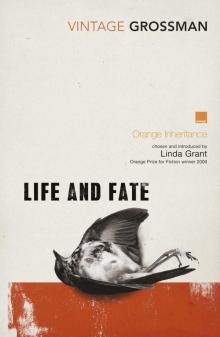 Life and Fate
Life and Fate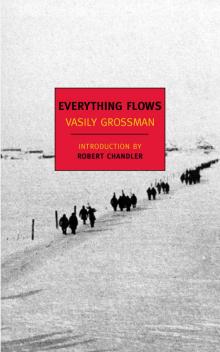 Everything Flows
Everything Flows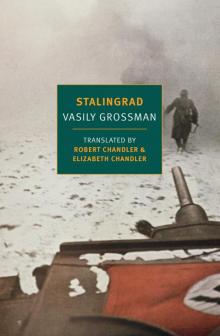 Stalingrad
Stalingrad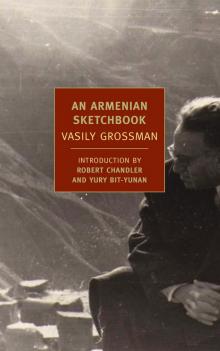 An Armenian Sketchbook
An Armenian Sketchbook The Road
The Road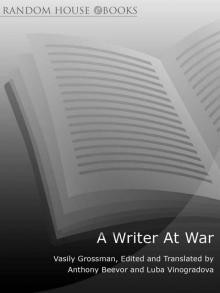 A Writer at War
A Writer at War